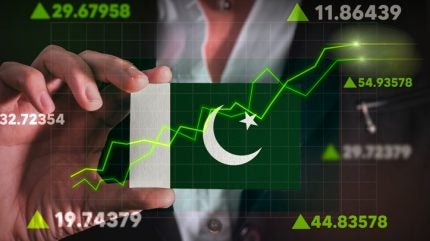
On paper, it seems as though Pakistan has been making strides in attracting FDI. The latest data from the State Bank of Pakistan shows that there has been a monthly rise in FDI compared to last year. The country received $136.3m in net FDI in July 2024, marking a 64% increase compared to July 2023.
Putting that into context paints a different picture. FDI inflows are still far from peak levels in the early 2000s and have been negatively impacted by the country’s political instability. There was a year-on-year decrease of 37.6% from 2021 to 2022.
This is against the backdrop of a lacklustre economy that has begun showing slight signs of recovery. Analysts say it is still too early to tell if positive indicators like slowing inflation and recovering foreign exchange reserves are the first building blocks of economic recovery.
Whether FDI can contribute to this recovery, as the government hopes, will depend on Pakistan’s ability to create an environment that can attract foreign investment.
Domestic politics
Between 2022 and 2023, a series of crises starting with a vote of no-confidence against former Prime Minister Imran Khan, unleashed a period of political instability. It ended with the arrest of Imran Khan for an alleged corruption case that led to mass protests.
Khan is the seventh former prime minister to be arrested in Pakistan. There has never been a prime minister that has managed to complete their five-year tenure.
This year brought more tension as officials were accused of rigging the elections in February. The commissioner of the garrison city of Rawalpindi subsequently admitted that he had been “deeply involved in serious crime like mega election rigging [in] 2024.”
As the crises unfolded one after the other, the economy lagged. The inflation rate shot up to 38% in May 2023 and foreign exchange reserves hit a low of $2.9bn in February 2023.
Looking to allies for help
Current Prime Minister Shehbaz Sharif has been on the trail for help from his closest allies: China, Saudi Arabia and the United Arab Emirates.
There have been a long series of meetings with Saudi officials regarding a $5bn investment pledge from Riyadh’s Public Investment Fund, a sovereign wealth fund with an estimated value of $900bn.
UAE President Sheikh Mohammed bin Zayed Al Nayan also had a one-day meeting with Sharif. Following the meeting, the Pakistan PM’s Office announced that the UAE had committed $10bn in investment in different fields.
Lastly, Sharif undertook a five-day trip to China which was the most politically significant. It came two months after there was an attack against a bus carrying Chinese workers in north Pakistan. At least five Chinese nationals and one Pakistani died.
China and Pakistan have grown closer, both militarily and economically throughout the years. Of Pakistan’s $130bn of foreign debt obligations, $30bn is owed to China. 23 MoUs were signed during Sharif’s visit but there were no concrete agreements aside from expressions of intent.
Climate considerations
The Overseas Investors Chamber of Commerce and Industry (OICCI) in Pakistan recently launched a report titled “Pakistan’s Climate Crossroads: Private Sector Solutions to Climate Challenges.”
OICCI President Rhan Shaikh argued that given Pakistan’s low contributions to global greenhouse emissions, it had an opportunity to attract international green financing of $500bn through focusing on climate-friendly projects.
This was met with some resistance from Sustainable Development Policy Institute Executive Director and COP29 Advisor Dr Abi Qaiyum Suleri, who highlighted that the country’s carbon credit policy program had entered the final stages.
The disagreement comes as countries ask themselves whether to adhere to climate policies planning for the future or prioritize short-term fiscal needs.
FDI potential
The bottom line is that to make Pakistan more attractive to investors, there must be a period of political and economic stability. Otherwise, it will be hard to draw investors away from neighbouring countries that may have better FDI infrastructure.



